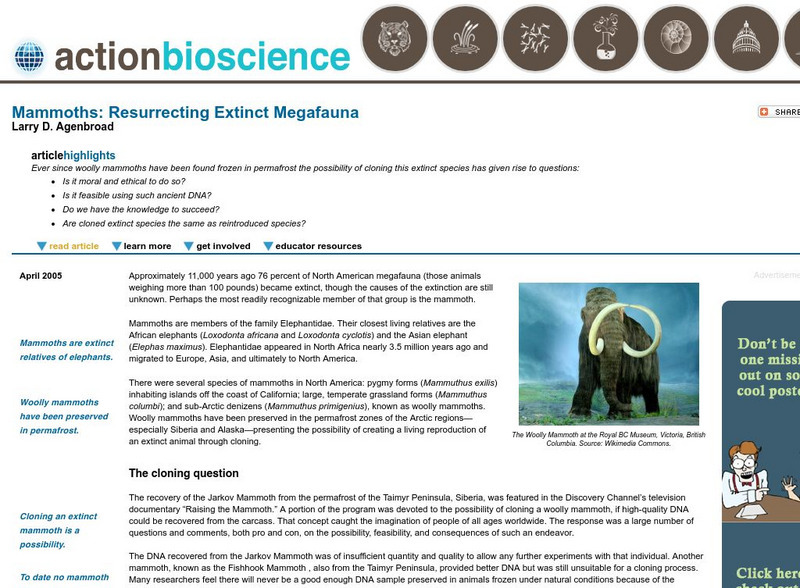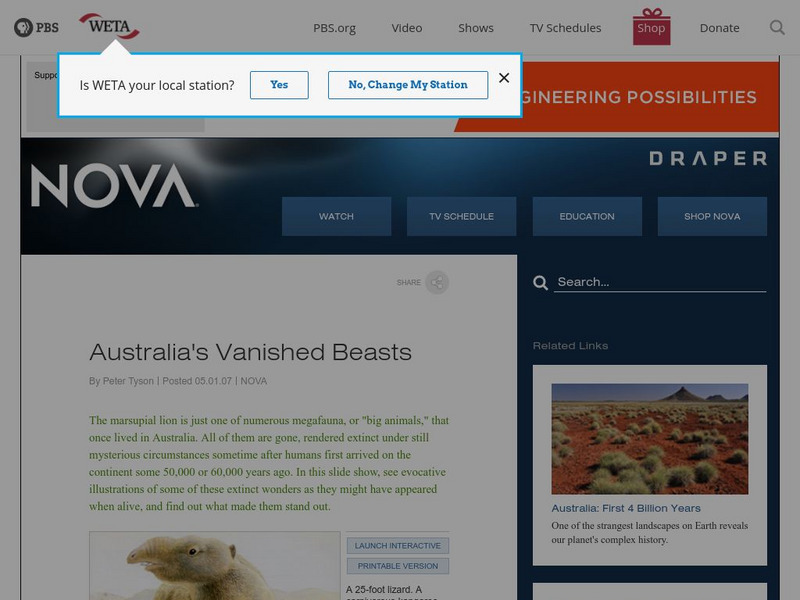Curated OER
Analysing Scientific Explanations for Megafauna Extinction
Students compare explanations for Australian's megafauna extinctions and identify reasons for popular acceptance of certain scientific explanations. They debate and analyze scientific explanations.
Curated OER
Giants of the Animal Kingdom
Fourth graders examine the megafauna found in Australia. They create a food web using cut-outs and develop a timeline to show changes in the fauna over time. They draw their own megafauna scene for their classroom.
Curated OER
America's Stone Age Explorers
Students watch a Nova program examining the earliest in habitants of the Americas. In groups. they take notes on various topics covered in the program. Among the topics covered are: the Clovis people, Solutrean culture, migration...
American Institute of Biological Sciences
Action Bioscience: Mammoths: Resurrecting Extinct Megafauna
Explore arguments for and against cloning. Includes an introduction of how cloning can be done.
PBS
Nova: America's Stone Age Explorers: End of the Big Beasts
Three opposing views about the disappearance of the "megafauna" in North America. What really happened to the wooly mammoth, mastadon, saber-toothed tiger, among other animals?
TED Talks
Ted: Ted Ed: From the Top of the Food Chain Down: Rewilding Our World
Our planet was once populated by megafauna, big top-of-the-food-chain predators that played their part in balancing our ecosystems. When those megafauna disappear, the result is a "trophic cascade," where every part of the ecosystem...
PBS
Nova: Bone Diggers: Australia's Vanished Beasts
Get profiles of 10 different examples of Australia's extinct megafauna. Each profile includes a picture of what the animal looked like.
PBS
Nova: The Extinction Enigma
45,000 - 50,000 years ago the megafauna of Australia became extinct. This interview investigates several possible causes such as, continental drift, human impact, and climate change.
Indiana University
Indiana University Bloomington: Comparing Ice Age Mammals [Pdf]
This activity allows students to compare the morphologies of 3-D printed teeth from Ice Age mammals. Students will manipulate 3-D prints and record observations in order to infer the diet of megafauna and discuss the role of technology...
BBC
Bbc Nature: Rhinoceroses
Rhinoceroses are megafauna and all five species alive today can reach over a tonne in weight as adults. While all the rhinos have horns, only the African species use them to fight with rivals. Learn more about the rhinoceroses in this...
CK-12 Foundation
Ck 12: Earth Science: History of Cenozoic Life
[Free Registration/Login may be required to access all resource tools.] An overview of life of the Cenozoic Era.
Museums Victoria
Melbourne Museum: Meet the Skeletons: Varanus (Megalania) Priscus
Varanus priscus was a prehistoric lizard that lived in Australia in the Pleistocene Period. Some information and pictures can be found here.








![Indiana University Bloomington: Comparing Ice Age Mammals [Pdf] Lesson Plan Indiana University Bloomington: Comparing Ice Age Mammals [Pdf] Lesson Plan](https://d15y2dacu3jp90.cloudfront.net/images/attachment_defaults/resource/large/FPO-knovation.png)

